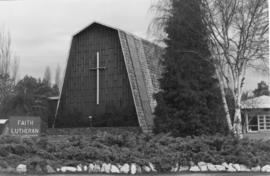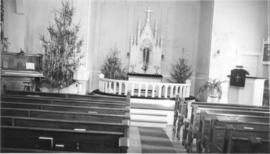Identity elements
Reference code
Name and location of repository
Level of description
Title
Date(s)
Extent
Content and structure elements
Scope and content
This folder contains a brief history of the church, various letters, list of congregations who have merged to form the church, a booklet from the 50th anniversary, a bulletin from the service of installation of R.L. Christensen 1980, an informational booklet from the church, a newsletter booklet, a booklet encouraging giving towards the new building project.
System of arrangement
Conditions of access and use elements
Conditions governing access
Physical access
Technical access
Conditions governing reproduction
Languages of the material
Scripts of the material
Language and script notes
Finding aids
Acquisition and appraisal elements
Custodial history
Immediate source of acquisition
Appraisal, destruction and scheduling information
Accruals
Related materials elements
Existence and location of originals
Existence and location of copies
Related archival materials
Related descriptions
Notes element
General note
Faith Lutheran Church was organized in 1954, a merger of First Lutheran and St. Mark’s Lutheran. Faith Lutheran was organized in Fairhaven as the Swedish Lutheran Church in 1892 by Pastor Peter Carlson, pioneer missionary of the Augustana Church. From 1892-1904, the congregation was linked with Bethsaida Lutheran in La Conner, with one pastor serving both congregations. In 1922 it merged with the Immanuel of Bellingham (organized in 1908), joining under the name of First Lutheran. St. Mark’s was organized in 1903 under the direction of Theophilus Schoenberg of the General Council of the ELC. It was the first congregation in the area to use English in worship. By the early 1950s, both congregations had outgrown buildings and were looking to a new future. Merger conversations led to a decision to form Faith Lutheran. A new facility in north Bellingham was dedicated in 1959.


